Politics
Diplomat Yergüz killed by ASALA commemorated in Geneva
Forty-three years after his assassination by the Armenian terrorist organization ASALA, Turkish diplomat Mehmet Savaş Yergüz was honored in a solemn memorial ceremony in Geneva, the city where he lost his life while serving his country.
Held at the Turkish Consulate General in Geneva on Monday, the ceremony brought together high-level Turkish officials, diplomats, representatives of Turkish civil society organizations in Switzerland and relatives of the fallen diplomat. Among those present were Türkiye’s Bern Ambassador Şebnem Incesu, Türkiye’s Permanent Representative to the World Trade Organization (WTO), Ambassador Hakan Çakıl, Consul General in Geneva Ipek Zeytinoğlu Özkan, Bekir Sıtkı Yergüz – cousin of the martyred diplomat – and officials from the Ministry of Labor and Social Security, including Director General for EU and Foreign Relations Ali Aybey, who were attending the 113th International Labor Conference in Geneva.
The ceremony began with a moment of silence followed by the Turkish national anthem. A biography of Yergüz was read aloud, honoring his life and service.
Speaking at the event, Incesu paid tribute to Yergüz, emphasizing the heavy cost Türkiye has paid in the fight against terrorism. Recalling a line from the book “Şehit Diplomatlarımız” (“Our Martyred Diplomats”) by the late Ambassador Bilal Şimşir, she noted, “In the 1970s and 1980s, planes carried the coffins of our fallen diplomats from all corners of the world back to Türkiye.”
“Let us remember with mercy those who gave their lives for their country or were targeted because of their connection to it,” she said.
Incesu highlighted the distortion of history that has fueled terror campaigns like those perpetrated by ASALA.
“We have painfully experienced how a one-sided and selective reading of history, coupled with a radical and violent nationalism, transformed into an international terror campaign – leading to a distorted narrative that seeks to justify even the most heinous acts.”
She underscored that terrorism, regardless of its name or form, remains a global threat.
“Terrorism knows no borders. It must be fought without discrimination, in a spirit of global cooperation. Türkiye fulfills its responsibilities in this struggle and continues to stand at the forefront in raising awareness within the international community.”
“Decades of experience fighting various terrorist groups have taught us that we cannot forget. We must not forget,” she added. “Honoring our fallen and standing with their loved ones is a sacred duty.”
Özkan echoed similar sentiments in her remarks, stressing the importance of keeping the memories of Türkiye’s martyrs alive.
“We cannot bring back our fallen diplomats, but our most essential duty is to honor their sacred memory and share the pain of their families – no matter how many years may pass.”
Describing Yergüz as a diligent, patriotic and kind-hearted man, Özkan said his murder sent shockwaves through his family, the consulate and the Turkish nation.
“To be targeted and murdered in cold blood simply for representing the Republic of Türkiye is a tragedy that shook us all. The perpetrator of the attack, ASALA member Mardiros Cankoçyan, was apprehended the same day thanks to public support. During his interrogation on June 12, 1981, he confessed to murdering to avenge ‘1.5 million Armenians.’ Türkiye, which became the target of Armenian terrorism in the 1970s and 80s, was victimized by a generation indoctrinated with a hate-filled and distorted version of history.”
Özkan emphasized that Türkiye has never wavered in the face of terrorism and continues to stand firm in defending historical truth.
“Türkiye has always maintained that we must build friendship, not animosity, from our shared history. In this respect, recent statements by Armenian Prime Minister Nikol Pashinyan concerning the events of 1915 have been encouraging steps toward reconciliation. We hope that, despite pressures from the diaspora and domestic forces, real peace will one day be possible in the region.”
Touching on the ongoing normalization process between Türkiye and Armenia, Özkan reiterated that Türkiye is committed to fostering dialogue and reconciliation.
She also paid respect to other fallen diplomats around the world who lost their lives in the line of duty.
Following the ceremony at the consulate, attendees visited the exact location in Geneva where Yergüz was assassinated in 1981. In his memory, a wreath was laid at the site. Participants observed a moment of silence and placed red carnations alongside the memorial.
Yergüz was killed on June 9, 1981, in Geneva by ASALA, one of many diplomats targeted in a wave of assassinations carried out by Armenian terrorist organizations during the late 20th century. These attacks aimed to exert pressure on Türkiye over historical grievances. Between 1973 and 1994, Armenian terrorist groups killed over 30 Turkish diplomats and family members.
The ceremony served as a reminder of both the personal and national sacrifices made in the service of diplomacy and the enduring need to stand against terrorism in all its forms.
Politics
Türkiye’s ‘family diplomacy’ makes waves across world
“Family diplomacy” takes center stage as Türkiye aims to raise awareness on the preservation of the family and strengthening this core element of society. The Ministry of Family and Social Services leads the efforts to that extent on an international level.
The ministry said in a statement on Monday that they have been active in international platforms to highlight the issue, especially in the face of global risks.
Türkiye joined a United Nations initiative in 2024 for family and, under the U.N. roof, hosted numerous international side events focusing on the protection of the family.
As part of these efforts, a call to mobilize around the foster family model was made at the 79th U.N. General Assembly, followed by an emphasis on family-inspired women’s entrepreneurship at the 69th session of the U.N. Commission on the Status of Women. In 2025, at the 80th U.N. General Assembly, a call was issued for global solidarity, starting from the family to counter emerging threats. In addition, the concept of “family-supported social development” was placed on the agenda at the second U.N. World Summit for Social Development.
Through Türkiye’s initiatives, cooperation frameworks on family and social policy were added to the agenda of the Organization of Turkic States (OTS). The first ministerial meeting in this field was held in Istanbul in May 2024, followed by a second meeting in June 2025 in Baku, Azerbaijan. Family and population issues were also incorporated into the working areas of the Economic Cooperation Organization under Türkiye’s leadership.
Within the scope of 2025 being designated the “Year of the Family,” the International Family Forum held in Istanbul in May brought together participants from 26 countries. An international symposium titled “Toward the Decade of Family and Population” was also held in Ankara.
Meanwhile, at Türkiye’s proposal, the Organization of Islamic Cooperation’s (OIC) 2026-2035 Action Program included “the protection of the family, generations and a strong population structure” as a distinct priority area. The United Arab Emirates (UAE), Nigeria, Egypt and the Turkish Republic of Northern Cyprus (TRNC) also declared 2026 as the “Year of the Family.”
As work continues on a draft resolution to declare 2026-2035 the “Decade of Family and Population” within the OIC, a separate draft resolution was adopted to protect young people’s rights in digital gaming and social media across member states.
During the tenure of Family and Social Services Minister Mahinur Özdemir Göktaş, 22 memoranda of understanding (MOUs) and four action plans related to family policies were signed with foreign counterpart institutions through international engagements. This figure represents 40% of all agreements signed since the ministry’s establishment.
Politics
No immediate threat of US-Iran war, diplomatic solution possible: Fidan
Foreign Minister Hakan said the ongoing tensions between the U.S. and Iran could be solved through creative diplomacy, after recent talks between the two countries.
Speaking on a live broadcast, Fidan said the emergence of a positive atmosphere after the first contact in a long while is significant for Ankara. He noted that a creative solution is needed and that both sides appear to show a willingness to work toward resolving the issue. He added that, for now, there does not seem to be an immediate threat of war.
“After the first contact following a long break, the emergence of a positive atmosphere is important for us. We need to find a creative solution, and we see that both sides have the will to resolve the issue. For now, it seems there is at least no immediate threat of war,” Fidan said.
The top Turkish diplomat said the Iran issue remains a central focus for Ankara, stressing that the region cannot withstand another war and that President Recep Tayyip Erdoğan is closely following the file.
He noted that Iranian and U.S. officials held rare talks in Oman two days ago, where Iran’s Foreign Minister Abbas Araghchi briefed counterparts on the discussions.
Fidan said that if a solution can be reached on the Iran file, other issues could also be brought to the table, noting that the nuclear dispute is primarily a matter between the U.S. and global security, while other topics are regional and not directly tied to U.S. security.
He said there is a belief that resolving the nuclear issue would make progress on other disputes easier and that Ankara has conveyed this view to both sides in an effort to establish a workable framework. Fidan added that this dynamic should not be seen as a surprise, as parties often prepare alternative scenarios where hostilities exist. He pointed to U.S. displays of pressure – such as deploying major fleets, bombers, and strategic assets – and Iran’s statements about increasing its missile numbers as signs that any potential confrontation would be costly for both. “First, it is about demonstrating strength; second, being prepared,” he said.
Regime change not possible in Iran
In response to a question about whether he thinks regime change could be possible in Iran through U.S. airstrikes, Fidan said regimes do not change through airstrikes.
“I don’t think regime change is possible in Iran,” he said.
Fidan dismissed the idea of regime change in Iran as unrealistic, saying such expectations amount to “an empty dream.”
He said a more plausible scenario would be a government weakened by its inability to provide public services, prompting the existing leadership to make radical decisions and adjust course. He noted that discussions take place on two levels – formal talks and more candid exchanges – and argued that the problem lies not in Iran’s system itself but in the decisions and policies it pursues.
Fidan said Iran’s long-standing revolutionary cadre continues to govern the country with an approach shaped by the 1979 revolution rather than a conventional nation-state model, creating structural challenges.
While Iran is not building a bomb, Fidan said, it is developing capabilities close to it, which exposes the country to sanctions. “People misunderstand this,” he said. “They are not producing a bomb, nor is there evidence they intend to, but they are enriching uranium to a level that raises concern. The issue at hand is uranium enrichment.”
Fidan recalled that Iran was struck while negotiations were ongoing and described how, during the 12-day June war, Washington warned Ankara that “anything could happen within hours,” even as talks were scheduled.
“The U.S. was the one talking; Israel was the one striking,” he said, adding that conditions may be different this time and that Türkiye is doing all it can to avert a catastrophe. He noted that Iran has its own decision-making structure, with established rules for negotiations, including location, modality, and participants. Ankara proposed a different method, encouraging Iranian and U.S. officials to meet face-to-face instead of speaking through a mediator in separate rooms, but Iran opted to continue the system used in Oman and that Ankara respects the choice of its neighbor.
Fidan said Iran faces major existential challenges and that Türkiye held extensive consultations in early February with regional partners, including Qatar, Saudi Arabia, Egypt and the United Arab Emirates, all of whom showed strong interest. He added that during discussions on the Palestine issue, Türkiye brought regional countries together around shared ideas and delivered a strong diplomatic effort. “We suggested showing the same kind of solidarity on the Iran issue,” he said, proposing a joint platform to build consensus and present a unified message to the parties. He noted that the United States welcomed this approach, saying it had proven effective in Gaza by fostering regional ownership and coordinated action. “We are moving forward as a strong team,” Fidan said, “but the challenges remain substantial.”
‘Restoring regional cooperation vital’
Fidan said the region needs stronger cooperation platforms, stressing that the most urgent requirement is for regional countries to restore mutual confidence.
He noted that this trust deficit must be addressed and added that President Erdoğan’s perspective focuses on institutionalizing regional solidarity in the military, political and economic fields. He continued by saying that ongoing discussions on these ideas are important and that several advanced proposals are now on the table. He added that he expects developments in the near future that will contribute to regional stability.
Dialogue rather than bloodshed necessary in Syria
Fidan said limited progress has been made on preserving the unity and territorial integrity of Syria, but stressed the importance of advancing the process through dialogue rather than bloodshed.
He noted that although more work remains, the withdrawal of the terrorist PKK’s Syrian offshoot, YPG, from occupied areas and its repositioning in predominantly YPG/PKK-held regions marks an improvement compared to earlier maps.
Still, he said, additional steps required under existing agreements must be completed, as mistrust persists on both sides. Fidan argued that the YPG must undergo a historic transformation, adopting a more realistic, Syrian-oriented posture that does not threaten the security of Iraq or Türkiye and is not aligned with the goals of the PKK. Such a shift, he added, would create space for legitimate political engagement by Kurdish communities. He said Türkiye has conveyed this message to President Bashar Assad as well and will follow the process closely, emphasizing that equal rights for all Syrian citizens are essential.
Fidan added that Kurdish communities had little opportunity to engage with Damascus due to years under different controlling forces but are now gradually reconnecting. Türkiye, he said, has long taken a sensitive approach toward Syrian Kurds, raising their lack of citizenship and sense of belonging in past meetings with Assad. He noted that toxic narratives have taken root, including PKK-driven claims portraying all Sunni Arabs as Daesh members, and opposing narratives portraying all Kurds as PKK or YPG. These, he said, must be isolated. Fidan praised the stance of Ahmet Şara and his colleagues, saying they did not oppress civilians, and expressed hope that this chapter will close in a way that benefits both Kurds and Arabs, alleviates Türkiye’s security concerns, and helps Syria move toward a more stable future.
Earlier on Monday, Fidan spoke by phone with his Iranian counterpart, discussing ongoing nuclear negotiations, according to Turkish diplomatic sources.
Türkiye was named as one of the potential venues for direct talks between Iran and the U.S., after U.S. President Donald Trump threatened to strike Iran following weeks of deadly protests in Türkiye’s eastern neighbor. Iran said last Wednesday that the talks would take place in Oman’s Muscat on Friday amid rumors that negotiations may collapse due to disagreements about the format and the venue.
Ankara, which maintains close ties with Iran and the U.S., has advocated dialogue since tensions gradually escalated over the past few weeks. President Recep Tayyip Erdoğan conducted phone diplomacy with both Trump and Iranian President Masoud Pezeshkian during the crisis, while Araghchi met his Turkish counterpart Fidan in Istanbul in January.
Politics
Turkish army joins biggest NATO exercise with 2,000 personnel
NATO stages its biggest exercise this year in Germany, with some 10,000 personnel from 11 countries. Türkiye, which has the defense body’s second-largest army, dispatched 2,000 personnel for Steadfast Dart 2026, which began on Sunday. The exercise, which will continue until Feb. 20, aims to showcase NATO’s ability to deploy rapidly and conduct complex operations, the body said in a statement earlier this month.
It is the first time that Türkiye sent so many troops to Northern Europe, though the country is a major component of NATO at a time of heightened defense worries in Europe.
Türkiye aims to demonstrate its locally made weapons systems at the exercise in Germany. The country plays a strategic role in the Allied Reaction Force (ARF) that will test NATO’s readiness in a simulated conflict scenario.
The 66th Mechanized Infantry Brigade Command of the Turkish army will be among those representing the country at the exercise. Soldiers from the command’s base in northwestern Türkiye’s Tekirdağ province left for Germany on Saturday after a ceremony. Speaking there, the brigade’s commander, Brig. Gen. Hulusi Koçbay, said that the exercise would involve simultaneous use of land, air and naval vehicles and that they had contributed 650 personnel and 149 vehicles to the exercise, pointing out that they would use locally produced weapons and equipment. He said the TCG Anadolu vessel of the navy and a civilian transportation ship left Türkiye on Jan. 20 for the deployment of vehicles and munitions and already arrived at Germany’s Emden port.
“We will conduct joint training with other countries in several fields for combat and improve our cooperation abilities within NATO. We are ready to conduct any tasks we are assigned to demonstrate efficiency and visibility of our Land Forces in NATO,” he said. The combat group consists of a motorized infantry battalion, an artillery battery, an engineer combat company, a maintenance unit and a field service company.
Türkiye played a critical role in the Western-centric bloc, which expanded its influence across Europe. Commanding one of the strongest armies in the alliance, the country is also a key member of NATO due to its location on the southeastern tip of Europe, at the gateway to Asia for Europe.
Although it has started courting NATO’s traditional rivals more in recent years, Türkiye is firmly aligned with the alliance, as its leaders repeatedly confirmed. Türkiye’s membership is viewed as winning a reliable ally in NATO’s southern wing in terms of air, land and maritime defense. The country is already in the top five countries contributing to NATO’s operations and missions.
Türkiye’s strategic location makes it the first defense against threats and risks in the region for NATO, while the alliance is an essential component in Türkiye’s security and defense. The country particularly proved its worth to the alliance, which sees terrorism as one of the main threats.
In the Balkans, Türkiye is the top contributor to the alliance’s Kosovo Force (KFOR), which maintained command of the forces between 2023 and 2024. It currently holds deputy command of the force, while it was the top contributor to the reserve battalion in Kosovo to ensure the security of the Balkan country and the region.
It is also a top contributor in terms of personnel to NATO’s Iraq mission, which was founded in 2018 to provide consultancy and training to Iraqi security forces.
In NATO’s military exercises, Türkiye is a prominent actor. It also commands NATO’s permanent maritime task group and a task group against naval mines.
The country provides financial and personnel support to NATO, primarily for building defense capacity. In 2024, it became one of 24 NATO members achieving a 2.09% goal in the proportion of estimated defense expenditures to gross domestic product (GDP). Türkiye ranks eighth among the top contributors to NATO in contributing to joint funds, at 4.59%, and seventh in terms of personnel contribution to the alliance’s entire cadres.
Türkiye also hosts critical NATO facilities, including Allied Land Command, which is located in the western city of Izmir, and Rapid Deployable Corps, which is based in Istanbul. In the capital, Ankara, it hosts the Centre of Excellence for Defence Against Terrorism (COE-DAT) and the Partnership for Peace Training Center. Istanbul hosts the NATO Maritime Security Centre of Excellence (MARSEC COE).
The country’s rapidly growing defense industry makes it a valuable member of the alliance in terms of innovation and production in the industry. This has become especially prominent in light of the ongoing conflict in Ukraine and the beginning of the second Trump era in the U.S., bringing the “strong defense industry” element to the forefront of the alliance’s agenda. In addition to being NATO’s second-largest army, Türkiye has solidified its privileged position in recent years with advancements in its defense industry, producing a wide range of military products and equipment.
Its innovative defense industry has gained significant attention from both NATO and allied countries. The use of Turkish-made drones by Ukraine has underscored this.
Politics
Türkiye’s MHP celebrates 57th anniversary
Government ally Nationalist Movement Party (MHP) will mark its 57th anniversary on Monday. Party Chair Devlet Bahçeli will convene fellow members at a major event in Ankara on the occasion of the anniversary.
The MHP was founded in 1969, or rather, changed its name from the Republican Villager Nation Party (CKMP) in a convention that year. The CKMP was founded by Alparslan Türkeş, a military officer who fell out with the junta regime that seized power in 1960. The party held a two-day convention on Feb. 8-9, 1969, that concluded with the name change and adoption of three crescents as its emblem. It is the longest-surviving nationalist party in Turkish politics.
Four years after the name change, the party secured two seats in the government founded in 1973. It further expanded its clout by securing 16 seats at the Parliament in the 1977 elections and joining the coalition government led by Prime Minister Süleyman Demirel.
The MHP shared the fate of other parties after the 1980 coup and was shut down while its leader, Alparslan Türkeş, was banned from politics. As other parties did, it went on to change its name again, this time to the Nationalist Workers Party (MÇP) in 1985. The party switched back to the MHP name in 1993, four years before the passing of Türkeş. The incumbent chair, Devlet Bahçeli, defeated Türkeş’s son Tuğrul in the 1997 intraparty elections and has served in this capacity since then. Under Bahçeli, the MHP increased its votes and became the second party after the Democratic Left Party (DSP) in the 1999 elections, leading to a coalition government between the DSP, MHP and Motherland Party (ANAP). The party’s votes, however, skydived in the 2002 elections, where it failed to win any seats in Parliament. It was only in 2007 that it returned to Parliament with 71 seats. Since then, it gradually increased the number of seats with successive electoral victories.
2015 was another breaking point for the MHP, after the death of Türkeş. Three prominent figures of the party sought “change” after the 2015 elections and challenged Bahçeli to a new intraparty election. Bahçeli rejected the bid, paving the way for a split. Bahçeli’s opponents in the party, led by Meral Akşener, went on to found the Good Party (IP).
Initially wary of the ruling Justice and Development Party (AK Party), the MHP decided to side with them after the July 15, 2016 coup attempt by the Gülenist Terror Group (FETÖ) sought to topple the AK Party government. Bahçeli openly supported the executive presidency system for Türkiye and constitutional changes stipulated in a referendum proposed by the AK Party. The MHP’s support for AK Party chair and President Recep Tayyip Erdoğan took another turn when it agreed to form the People’s Alliance with the AK Party in the 2018 elections. The party’s votes declined after the formation of the alliance but it managed to secure 10.07% of the vote in the 2023 general elections. Currently, the MHP retains 47 seats at Parliament.
Politics
Aktaş arraigned for corruption plaguing cities run by Türkiye’s CHP
Aziz İhsan Aktaş, a prominent businessperson accused of running a criminal ring thriving on briberies to municipalities run by the main opposition Republican People’s Party (CHP) will make his first court appearance this week.
He is among 200 defendants on a case that shed light on bribes and tender-rigging processes in municipalities that also netted prominent mayors of the CHP. Aktaş was released and sentenced to house arrest last year after his initial arrest in 2024, when he decided to collaborate with authorities. In January, the first hearing of defendants in the case was held in Istanbul. An indictment says Aktaş and his associates bribed their way into lucrative tenders and building permits. Several CHP mayors in Istanbul, including Beşiktaş’ Rıza Akpolat, Avcılar District Mayor Utku Caner Çaykara, as well as mayors of southern city of Adana and southeastern city of Adıyaman were also named in the indictment. The latter two were released before the trial began.
An Istanbul court heard testimonies of 33 defendants so far in the previous hearings. Among them were Akpolat who faces prison terms up to 337 years on charges of corruption.
Aktaş faces prison terms up to 450 years for his role as the “leader of the criminal ring” as prosecutors defined him.
The arrests of Aktaş and Akpolat were first in a long line of investigations into alleged rampant corruption in CHP-run municipalities. In March 2025, Istanbul Mayor Ekrem Imamoğlu, a prominent figure in the party, was arrested on the same charges. More arrests followed on similar charges in the following months as investigations also expanded to other cities run by the CHP, such as Antalya in the south. The CHP claims the arrests are politically motivated and regularly holds public rallies to denounce them and call for release of mayors. The government insists that the judiciary is independent.
Prosecutors say Imamoğlu’s win in the 2024 election, where he secured a second term as Istanbul mayor, helped Aktaş’s criminal network to enter “into a golden age” of their corruption web. They say the network secured public tenders from the IBB and district municipalities of Türkiye’s most populated city since 2020, including Beşiktaş, Avcılar and Esenyurt municipalities.
Politics
Mayor quits Türkiye’s CHP after chairperson’s insults
Mesut Özarslan, mayor of Ankara’s Keçiören district for the main opposition Republican People’s Party (CHP), announced his resignation from the party on Sunday evening, after disclosing that the party’s chair, Özgür Özel, sent him derogatory messages.
Özarslan, elected to office in the 2024 municipal elections, was long rumored to join the ruling Justice and Development Party (AK Party). His meeting with Environment, Urban Planning and Climate Change Minister Murat Kurum further triggered the rumors. Özarslan disclosed that it was his meeting with Kurum that led to a defamation campaign by “some cliques” within the CHP against him.
In a lengthy social media post on Sunday, Özarslan said it was common for him to meet government officials to find solutions to Keçiören’s issues, but his Jan. 6 meeting with Kurum fueled “gossip by certain cliques in the party.” “I tried to remain silent in the face of pressure, rumors and defamation, but CHP chair, Mr. Özgür Özel, started sending me WhatsApp messages on Saturday, at 23:59. His messages contained insults, threats and slander contradicting political etiquette and humanity. Does a party chair insult a mayor and his family? Does a party chair have the right to insult by using swear words? I cannot continue serving in the CHP in the face of messages where even my parents are sworn at. I believe I cannot serve as a mayor (for CHP) in the face of those messages. I am not reacting against CHP, its voters. I am reacting only against the current administration, which has lost political etiquette,” he wrote.
“We were committed to serving people when we were nominated and elected, committed to walk together on this path to gain the favor of people and Allah. But at this point, I don’t see that either Özel or his colleagues have any sacred values. I call upon all my friends (in the CHP) to save themselves from this network of immoral people,” he added.
Along with Özarslan, seven members of the Keçiören municipal assembly resigned from the CHP on Sunday, while Deputy Mayor Emir Can Tunç and acting Mayor Tolga Turgut announced their resignation from the post and said they would remain in the CHP.
Several media outlets published unconfirmed screenshots of messages Özel sent to Özarslan, including ones where he called the mayor “b**tard.” Özel, quoted by pro-CHP Halk TV, denied using swear words in the messages, though he acknowledged that he wrote “harsh words.”
Özarslan quit the Good Party (IP) in 2023 and joined the CHP, working alongside Ankara Mayor Mansur Yavaş, a former nationalist politician. He is the first CHP mayor this year so far to quit the party, which boosted its vote in the 2024 municipal elections. Last year, Özlem Çerçioğlu, mayor of Aydın province in western Türkiye, resigned from the CHP and joined the AK Party, though she faced a barrage of slander on social media by CHP supporters and was repeatedly targeted in Özel’s speeches.
-
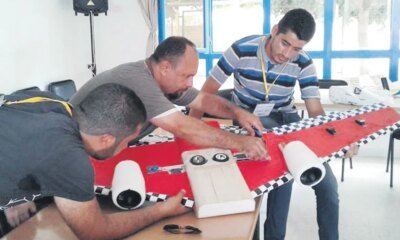
 Daily Agenda3 days ago
Daily Agenda3 days agoHistorical blow from MİT to Mossad: Trade-masked assassination network collapsed
-
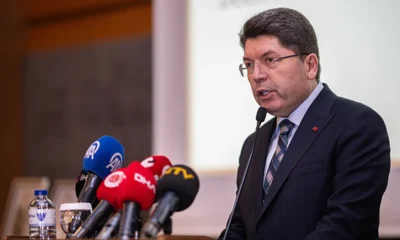
 Daily Agenda1 day ago
Daily Agenda1 day agoMinister of Justice Tunç: “The regulation regarding children involved in crime will come to the parliament after the commission works are completed.”
-
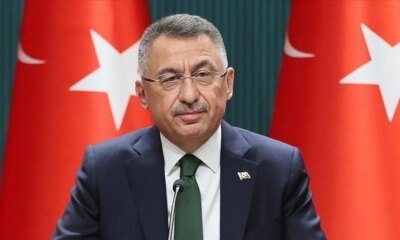
 Daily Agenda1 day ago
Daily Agenda1 day agoParliamentary Foreign Affairs Committee is going to the USA! Fuat Oktay: The constructive attitude of the congress is of critical importance in Türkiye-US relations
-
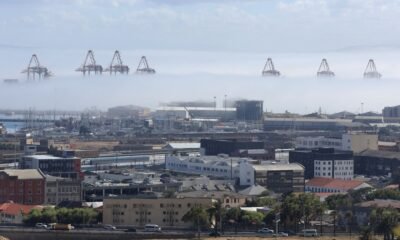
 Economy1 day ago
Economy1 day agoFacing US tariffs, South Africa steps toward trade deal with China
-

 Sports17 hours ago
Sports17 hours agoAkar carries Türkiye’s hopes into Olympic short track spotlight
-
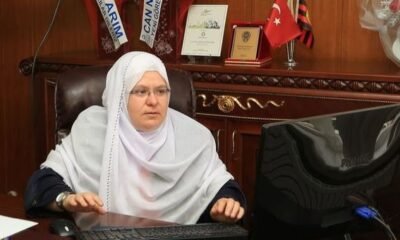
 Politics17 hours ago
Politics17 hours agoArrest, outrage after far-right man targets Turkish mayor’s dress
-
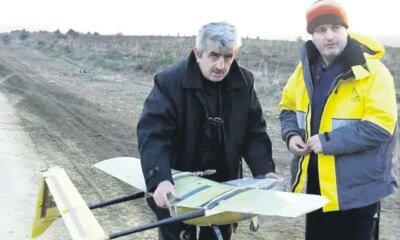
 Daily Agenda2 days ago
Daily Agenda2 days agoA Akıncı passed from this world
-

 Daily Agenda21 hours ago
Daily Agenda21 hours agoImmoral and excessive attack on women




